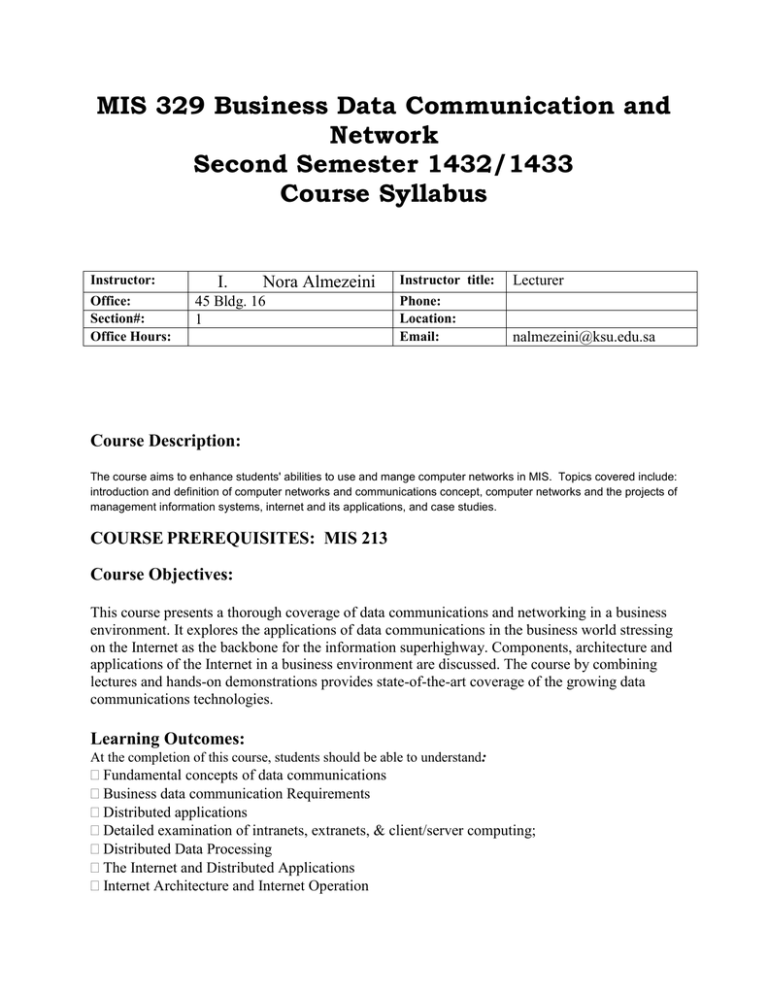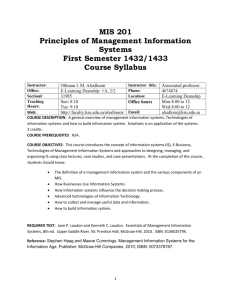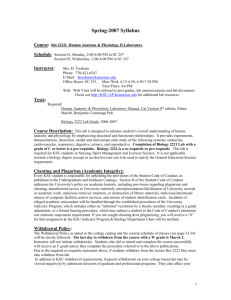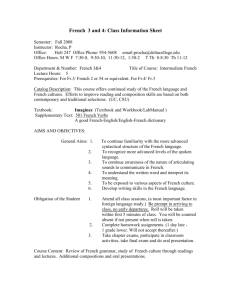Course Description - Business Data Communication
advertisement

MIS 329 Business Data Communication and Network Second Semester 1432/1433 Course Syllabus Instructor: Office: Section#: Office Hours: I. Nora Almezeini 45 Bldg. 16 1 Instructor title: Lecturer Phone: Location: Email: nalmezeini@ksu.edu.sa Course Description: The course aims to enhance students' abilities to use and mange computer networks in MIS. Topics covered include: introduction and definition of computer networks and communications concept, computer networks and the projects of management information systems, internet and its applications, and case studies. COURSE PREREQUISITES: MIS 213 Course Objectives: This course presents a thorough coverage of data communications and networking in a business environment. It explores the applications of data communications in the business world stressing on the Internet as the backbone for the information superhighway. Components, architecture and applications of the Internet in a business environment are discussed. The course by combining lectures and hands-on demonstrations provides state-of-the-art coverage of the growing data communications technologies. Learning Outcomes: At the completion of this course, students should be able to understand: Fundamental concepts of data communications Business data communication Requirements Distributed applications Detailed examination of intranets, extranets, & client/server computing; Distributed Data Processing The Internet and Distributed Applications Internet Architecture and Internet Operation TCP/IP and OSI Internet-Based Applications Client-Server and Intranet Computing Local Area Networks and LAN Architecture and Protocols Teaching Methods: Face to face interaction with students through Power Point presentations, lectures covering the theoretical part. Discussions of the Real-world case studies presented at each chapter Review questions towards the end of each section Teaching Resources: Main Textbook Business Data Communication (6th Ed), William Stallings. 6th edition, Prentice Hall, 2011 Course Plan Weeks 1 & 2: Introduction to Business Data Communication Information and communication The nature of Business Information Requirement The transmission of Information Management Issues Performance Measurement Week 3: Distributed Data Processing Forms of Distributed Data Processing. Distributed Data Network Implication Weeks 4 & 5: Internet Architecture Internet Architecture Circuit switching, Message Switching, and Packet switching Internet Domain Commercial use of the Internet Weeks 5 and 6: TCP/IP Simple Protocol Architecture TCP/IP Protocol Architecture Internetworking. Exam 1 Weeks 7 & 8: Internet-Based Applications Electronic Mail & SMTP Web Access and HTTP Internet Telephony and SIP Weeks 9 & 10: Client/Server and Intranet Computing. Client Server Applications Middleware Intranet Extranet Weeks 11 and 12: Internet Operations Internet Addressing Internet Routing Protocol Address Resolution Protocol (ARP) Exam 2 Weeks 13 & 14: LAN Architecture and Protocols LAN Configuration Backboned Networks and Storage Area Networks High Speed Office LAN Guided Transmission Media Week 15 LAN Protocol Architecture Medium Access Control (MAC) Logical Link Control LLC Week 16: Final Exam GRADES: (The instructor abides by the following grading scale strictly and DOES NOT curve at all.) Description Assignments Percentage Scale Grade 10 95 - 100 A+ First Test 25 90-94 A Second Test 25 85-89 B+ Final (Comprehensive) Exam 40 80-84 B 100% 75-79 C+ 70-74 C 65-69 D+ 60-64 D < 59 F Total Communication Blog : Mis3ksu.wordpress.com Dates of exams: Mid1 : 25th Oct, 2011 Mid2 : 13th Dec, 2011 1. Project AND ASSIGNMENTS: There will be one project and assignments administered throughout the semester. 2. TESTS: Two tests, which focus primarily on materials covered in class and from the textbook, will be administered during the semester. Students are strongly encouraged to visit the Companion Website for additional coverage of the materials presented in the textbook. In order to perform well on the tests, students must be familiar with the definitions listed in the Key Terms section, and do all the questions listed in the Review Questions section. Students who cannot take the scheduled tests must discuss with the instructor in advance. Makeup tests and exam will not be given except with prior notification and under extenuating and unavoidable circumstances. The burden of proof of said circumstances is on the student. Makeup examinations will usually differ from the original exam, and may be essay or oral. 3. FINAL EXAM: A comprehensive exam will be given during the KSU University exam schedule. The format of the final exam is relatively similar to the format for the tests. 4. ATTENDANCE: The attendance policy follows the guidelines stated in the KSU Catalog ( http://www.KSU.edu.sa/). Students must assume full responsibility for any loss incurred because of absence, whether excused or unexcused. All work missed because of absences will receive a grade of zero. Excused absences are those resulting from the student’s participation in a University-sponsored activity, from recognizable emergencies, or from serious illness. Students are encouraged to participate actively in class discussion and presentation. 5. KSU HONOR CODE: All students must obey the KSU Honor Code diligently. The Honor Code is based on the need for trust in an academic community. KSU’s Honor Code is a system developed by and maintained for the welfare of its students, and all students should make sure that they read and understand the provisions outlined in the Student Handbook (read http://www.ksu.edu.sa). All work completed for this course will be considered pledged. CHEATING IS ABSOLUTELY NOT TOLERATED AT KSU UNIVERSITY. Plagiarism is a violation of the Honor code. All papers submitted in this course are subject to evaluation using plagiarism detection software. 6. ACADEMIC DISHONESTY POLICY: Cheating in any form will not be tolerated in the College of Business. If the instructor determines that a student has cheated on an assignment, the grade of “F” may be assigned for the entire course. “Cheating” is the use of unauthorized resources and/or work of another including but not limited to homework, tests, papers, presentations and exams. Unless specifically instructed otherwise, students are to assume that all coursework is to be the work of the individual student alone. If a student is unsure as to whether collaboration is permitted, the professor should be contacted in advance of performing the work. If a faculty member penalizes a student in a course for an Honour Code violation, they should also bring formal charges against the student with the University Honour Board. 7. LEARNING DISABILITIES: Any student who feels that he may need accommodations based on the impact of a physical, psychological, medical, or learning disability should contact Students' Affair Office. 8. INCLEMENT WEATHER POLICY: In cases of inclement weather, commuter and campus based disabled students will be permitted to make decisions about whether or not to attend classes without penalty. If the University is open, it is expected that residence students will attend all classes being held that day. Cancelled classes will not be rescheduled since students should utilize the cancelled class period as computer lab time. COMMENTS: The instructor reserves the right to make any appropriate and necessary changes to the Course Syllabus and Class Schedule. Students are responsible for all materials covered in class as well as materials in the textbook. If you must be absent, the instructor assumes that you have obtained notes from a classmate. Any student having difficulty with the materials should make an appointment to see the instructor. Private conversations between students are disruptive and annoying to both the instructor and other students. Therefore, students with disruptive and annoying behaviours are dismissed from class until the behaviour is under control.




